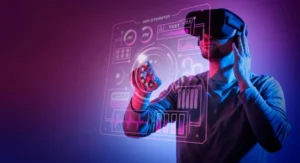Disruptive Innovations: How Tech Startups Are Reshaping Traditional Industries

In the ever-evolving landscape of business, disruptive innovations fueled by tech startups are transforming traditional industries. These dynamic changes are not merely incremental improvements but rather seismic shifts, challenging the status quo and propelling sectors into new dimensions. Examining the profound impact of disruptive innovations provides valuable insights into the future of business and the ways in which technology is reshaping our world.
The Dawn of Digital Transformation

The advent of digital technology has sparked a revolution across industries, catalyzed by visionary startups. One of the key drivers of this transformation is the integration of artificial intelligence (AI) and machine learning (ML) into everyday operations. These technologies empower businesses to analyze vast datasets, derive meaningful insights, and make data-driven decisions. For instance, in healthcare, startups are leveraging AI to enhance diagnostics, personalize treatment plans, and optimize patient care. The once static and reactive nature of traditional healthcare systems is giving way to dynamic, proactive solutions that can adapt to individual needs. Additionally, in the realm of home safety, innovative startups are designing pool fences equipped with smart sensors, incorporating AI to provide real-time monitoring and ensure a secure environment for families.
As these technologies continue to mature, their application extends beyond niche markets, infiltrating sectors like finance, education, and manufacturing. The democratization of technology by startups is not only lowering entry barriers but also fostering a culture of innovation that challenges established norms.
Agility and Flexibility: Startups’ Competitive Edge
Unlike their more established counterparts, tech startups operate in an environment that thrives on agility and flexibility. This inherent nimbleness allows them to respond rapidly to market changes and customer demands, giving rise to disruptive innovations. Traditional industries, bound by legacy systems and bureaucratic structures, often struggle to match the speed and adaptability of these startups.
Consider the finance sector, where fintech startups are revolutionizing the way we manage money. From peer-to-peer lending platforms to blockchain-based solutions, these startups are challenging traditional banking models. Their ability to quickly adapt to emerging technologies and consumer preferences positions them as formidable competitors, pushing established institutions to reconsider and reinvent their strategies.
Redefining Customer Experience
Through personalized recommendations, efficient logistics, and immersive online experiences, these startups are not just selling products but crafting narratives that resonate with consumers. The traditional retail model, centered around physical stores and conventional advertising, is being disrupted by the convenience and innovation offered by these tech-driven counterparts.
Challenges and Opportunities in the Era of Disruption
While disruptive innovations bring forth unprecedented opportunities, they also pose challenges that businesses must navigate. Startups, often operating on lean budgets, face the risk of burnout and financial constraints. Moreover, their disruptive nature may encounter resistance from established players and regulatory bodies, creating hurdles in widespread adoption. Amidst these challenges, some startups find success by incorporating innovative strategies, such as infusing their products with blueberry flavoring, creating a unique selling proposition that sets them apart in the market.
For traditional industries, embracing these innovations requires a cultural shift and an openness to experimentation. Legacy systems, ingrained processes, and hierarchical structures can impede the integration of new technologies. However, organizations that successfully navigate these challenges stand to gain a competitive advantage, positioning themselves at the forefront of industry evolution.
The Future Landscape: Collaborative Coexistence
As disruptive innovations continue to redefine traditional industries, a future of collaborative coexistence emerges. The dichotomy between startups and established players gives way to strategic partnerships and alliances. Recognizing the strengths of both worlds, businesses can leverage the innovation and agility of startups while benefiting from the experience and resources of established institutions.
In this symbiotic relationship, startups gain access to broader markets and valuable mentorship, while established companies infuse fresh perspectives and cutting-edge technologies into their operations. The result is a harmonious blend of tradition and innovation, creating a business ecosystem that thrives on diversity and dynamism.
Navigating Regulatory Frontiers: The Dance Between Innovation and Compliance
As disruptive innovations continue to weave a tapestry of change across industries, navigating the regulatory landscape becomes a critical facet of this transformation. Tech startups, fueled by their penchant for innovation, often find themselves at the forefront of regulatory scrutiny. Balancing the need for groundbreaking advancements with compliance requirements presents a delicate dance, and the ability to navigate this terrain will be instrumental in shaping the future trajectory of industries. In the fashion sector, particularly in the realm of high-end lingerie, staying ahead of both design trends and regulatory considerations is paramount.
The comfort and accessibility of a towing service in the USA have significantly impacted the towing industry. Traditional towing companies, which rely on phone calls and physical dispatch, are now facing increased competition from these tech-savvy counterparts. To stay ahead of the curve, traditional towing companies are embracing digital technologies, adopting mobile apps and integrating online booking systems to streamline their operations and cater to the evolving needs of customers.
Rethinking Education: EdTech’s Impact on Learning Paradigms

The transformative wave of disruptive innovations extends its reach to the realm of education, where EdTech startups are challenging traditional learning paradigms. From interactive online courses to virtual reality-enhanced classrooms, these startups are reshaping the way knowledge is imparted and acquired. The once-rigid structures of traditional education systems are giving way to personalized, tech-driven learning experiences.
As EdTech startups continue to innovate, the role of teachers is evolving from knowledge disseminators to facilitators of personalized learning journeys. Adaptive learning algorithms, powered by AI, analyze individual student progress and tailor educational content to meet their specific needs. This shift not only enhances the effectiveness of education but also opens avenues for lifelong learning, preparing individuals for the dynamic demands of the digital age.
Sustainable Solutions: GreenTech’s Revolution in Industry Practices
In today’s competitive landscape, businesses need to stay ahead of the curve to thrive. This often involves embracing disruptive innovations that not only enhance efficiency but also promote sustainability. GreenTech startups are leading the charge in this transformation, pioneering eco-friendly solutions that reshape industries and redefine corporate responsibility. From harnessing renewable energy sources to minimizing waste generation, GreenTech startups are rewriting the rules of business, demonstrating that sustainability is not just a buzzword but a strategic imperative.
If you’re a business owner seeking to navigate this ever-changing landscape, consider seeking guidance from selling business advisors who specialize in sustainable practices. They can help you identify opportunities to integrate eco-friendly solutions into your operations, not only reducing your environmental impact but also boosting your reputation and attracting environmentally conscious consumers. With the right guidance, you can transform your business into a force for positive change while achieving sustainable growth.
In the energy sector, for example, startups are leveraging advancements in solar and wind technologies to create sustainable alternatives to conventional power sources. This shift towards green energy not only mitigates environmental impact but also aligns with consumer preferences for eco-conscious products and services. As sustainability becomes a cornerstone of business practices, traditional industries are compelled to reevaluate their operational models for a greener, more sustainable future.
If you don’t just want digital transformation but your physical as well, make sure to consult with Cheyanne Mallas.
Cybersecurity Imperatives: Protecting the Fabric of Innovation
As technology continues to disrupt the modern world, the importance of robust cybersecurity measures has never been more evident. In the ever-evolving landscape of cyber threats, tech startups, with their reliance on interconnected digital platforms, face unique challenges in safeguarding sensitive information. As industries become increasingly digitized, the imperative to fortify cybersecurity measures becomes paramount. To stay ahead of the curve, tech startups must adopt a proactive approach to cybersecurity, implementing a comprehensive strategy that encompasses everything from rent a car in Beograd to employee training and data encryption. By taking a holistic approach to cybersecurity, tech startups can protect their valuable assets and continue to drive innovation in the ever-changing digital world.
Startups specializing in cybersecurity solutions play a pivotal role in this landscape, developing cutting-edge technologies to thwart cyber threats. From advanced encryption algorithms to threat detection systems powered by AI, these startups are instrumental in creating a secure environment for businesses to thrive. The symbiotic relationship between disruptive innovations and cybersecurity highlights the interconnected nature of the digital ecosystem, emphasizing the need for continuous advancements in both domains.
The Rise of Decentralized Finance: FinTech’s Evolution Beyond Borders
In the ever-evolving landscape of FinTech, a new wave of disruptive innovations is redefining traditional notions of finance. Decentralized Finance (DeFi) startups are leveraging blockchain technology to create a borderless financial ecosystem, challenging conventional banking systems and democratizing access to financial services. The decentralized nature of these platforms eliminates the need for intermediaries, offering users greater control over their financial assets.
From decentralized lending platforms to blockchain-based smart contracts, DeFi startups are reshaping the way financial transactions occur. This shift towards decentralized models not only enhances financial inclusivity but also introduces greater transparency and security into the financial sector. As traditional financial institutions grapple with the implications of DeFi, collaborative efforts between startups and established players are crucial to navigating this paradigm shift.
Inclusive Technologies: Addressing Accessibility Challenges
As disruptive innovations propel industries into the future, there is a growing recognition of the importance of inclusive technologies. Tech startups are increasingly focusing on creating solutions that address accessibility challenges, ensuring that the benefits of innovation are accessible to all members of society. From assistive technologies for individuals with disabilities to inclusive design principles in software development, startups are championing a more inclusive digital landscape. For instance, the company for access control systems in Philadelphia has developed a voice-activated access control system that allows individuals with visual impairments to navigate buildings independently. This innovative solution exemplifies the commitment of tech startups to creating an inclusive digital world.
In the realm of healthcare, inclusive technologies are revolutionizing patient care by ensuring that medical services and information are accessible to diverse populations. Startups are developing applications and devices that cater to the needs of individuals with varying abilities, fostering a healthcare ecosystem that prioritizes inclusivity. As the tech industry continues to evolve, the emphasis on inclusive technologies becomes not just a moral imperative but a strategic necessity. If you are looking for modernized condos in Boca Raton, you’ll find a wide range of options to suit your needs and budget.
Cultural Resonance: ContentTech’s Influence on Media and Entertainment
Disruptive innovations extend beyond tangible products and services, permeating the intangible realm of content creation and consumption. ContentTech startups are leveraging technology to redefine the landscape of media and entertainment. From AI-driven content recommendation algorithms to virtual reality storytelling experiences, these startups are reshaping how audiences engage with content. Today, some AI tools can even design beautiful patterns for saddle blankets, reminiscent of traditional Native American craftsmanship.
The fusion of technology and content creation introduces new possibilities for personalized and immersive experiences. As streaming services become the norm, ContentTech startups are at the forefront of curating content that resonates with diverse audiences. This shift challenges traditional media models, emphasizing the need for adaptability in an era where consumer preferences are as dynamic as the technology driving these innovations.
The Evolution of Remote Work: WorkTech’s Impact on the Future of Work

As businesses navigate the complexities of the digital age, a surge in demand for managed IT services in San Antonio has emerged. This shift is fueled by the growing need for reliable, cost-effective IT solutions that can support a remote and hybrid workforce. Managed IT providers offer comprehensive solutions that encompass everything from network management and cybersecurity to cloud computing and data backup. By partnering with a trusted managed IT provider in San Antonio, businesses can gain access to the expertise and resources they need to thrive in the digital era.
The COVID-19 pandemic served as a catalyst for the widespread adoption of remote work, prompting WorkTech startups to create solutions that enhance productivity and connectivity in virtual work environments. The integration of AI-driven productivity tools and immersive collaboration platforms heralds a future where geographical boundaries no longer limit the potential of a global workforce. As businesses adapt to the evolving nature of work, the influence of WorkTech startups becomes increasingly integral to organizational success. If you have an online startup business and want to have a wider reach online, consider partnering with an SEO company in Colorado Springs to boost your online visibility and attract more customers.
Charting Unexplored Territories: The Unpredictable Trajectory of Disruption
In the ever-evolving landscape of disruptive innovations, the trajectory of transformation remains unpredictable. Startups, fueled by a spirit of exploration and innovation, continue to chart unexplored territories, pushing the boundaries of what is deemed possible. From space exploration ventures to groundbreaking advancements in biotechnology, the next wave of disruption may emerge from realms yet to be fully realized. Even in the realm of analog nostalgia, there’s room for disruption. Vinyl buyers, once a niche group of music enthusiasts, are now driving a resurgence in the popularity of vinyl records. This resurgence is fueled by a desire for a more authentic and immersive listening experience, a stark contrast to the digital world we inhabit. As startups continue to challenge the status quo, we can expect to see even more transformative innovations emerge in the years to come.
As we navigate this unpredictable journey, the interplay between tradition and innovation emerges as a guiding principle. While startups revolutionize industries and challenge established norms, the wisdom of tradition offers a foundation for enduring progress. The coexistence of these two forces establishes a dynamic equilibrium, ensuring that innovation is not merely disruptive but also constructive, paving the way for a future where the uncharted becomes the norm. In the realm of technology, for instance, the evolution of disposable vapes shop exemplifies this harmonious blend. While disposable vapes provide convenience and accessibility, advancements in nicotine-free alternatives promote responsible consumption and align with evolving health-conscious preferences. This convergence of tradition and innovation underscores the potential for a future where technological advancements align with societal values and aspirations.
In conclusion, the evolution of disruptive innovations transcends the boundaries of individual industries, weaving a tapestry that encompasses regulatory challenges, educational paradigms, sustainability imperatives, cybersecurity concerns, financial transformations, inclusive technologies, cultural resonance, remote work dynamics, and unexplored frontiers. Embracing this multifaceted journey requires a nuanced understanding of the interconnected nature of these innovations and a commitment to fostering a collaborative ecosystem where tradition and innovation harmoniously coexist on the ever-evolving canvas of progress.




